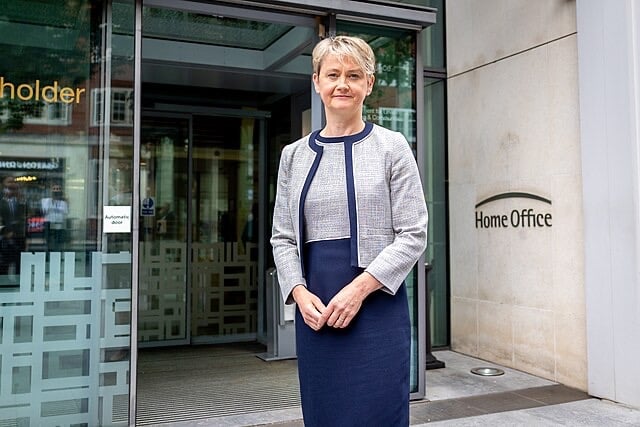Home Office lawyers have argued that the rights of asylum seekers outweigh those of Epping residents as the government appeals against a court ruling blocking migrants from being housed at the Bell Hotel.
Edward Brown KC, representing Home Secretary Yvette Cooper at the Court of Appeal this morning, said the hotel forms part of “critical national infrastructure” and that accommodating asylum seekers is in the “national interest”. The appeal challenges last week’s High Court decision granting Epping Forest Council a temporary injunction to close the hotel by 12 September.
There is a national interest in ensuring vulnerable individuals, namely asylum seekers, are accommodated,” Mr Brown told the court, arguing that Mr Justice Eyre was “wrong” not to allow the Home Office to challenge the council’s original application. The High Court judge had dismissed the government’s bid to intervene, ruling it was “not necessary” for the department to be involved.
Warning of Further Protests
In written submissions, Home Office lawyers warned the ruling could spark additional anti-immigration demonstrations, suggesting it “runs the risk of acting as an impetus for further violent protests. The hotel has already been the scene of multiple protests after an asylum seeker housed there was charged with sexually assaulting a teenage girl last month.
Mr Brown argued the judge had “erred” in treating the case as merely a planning dispute, telling the Court of Appeal: “The judge erred in declining to allow the Secretary of State to participate in the proceedings, given her unique institutional competence and her statutory duty. Her rights were clearly affected and she ought to have been heard in the application.”
The barrister confirmed that at the time of the 15 August High Court hearing, 138 asylum seekers were housed at the Bell Hotel, below its total capacity of 152.
Planning Law Arguments
Both the Home Office and hotel owner Somani Hotels are challenging Mr Justice Eyre’s ruling, which granted an interim injunction preventing the building’s use for asylum accommodation beyond 12 September. The judge found that whilst the council had not “definitively established” planning breaches, Somani Hotels had “sidestepped public scrutiny and explanation” by housing asylum seekers without planning permission.
Piers Riley-Smith, representing Somani Hotels, warned of the “extremely high-profile nature of the issue” creating a “risk of a precedent being set as a number of other local authorities are reported to be considering similar injunctions to address the use of hotels for asylum seekers”.
He argued: “The issue of the use of hotels for asylum seekers is one of national importance and scrutiny given the role it plays in [the Home Office’s] approach to meeting their statutory duty. The learned judge’s decision has received unprecedented media coverage and has been cited as setting a precedent for further injunctions to be sought by other local authorities.”
Criminal Charges and Protests
The Bell Hotel became a flashpoint after Hadush Gerberslasie Kebatu, an asylum seeker housed there, was charged with sexually assaulting a teenage girl. He has denied the offence and has been on trial this week. Another resident, Syrian national Mohammed Sharwarq, faces seven separate charges, whilst several other men have been charged over alleged disorder outside the hotel.
The protests and counter-protests have required Essex Police to draft in officers from other forces under mutual aid provisions, placing severe pressure on local policing resources. Council leader Chris Whitbread had previously warned of “irreparable harm to the local community” from the situation.
Council’s Defence
Philip Coppel KC, representing Epping Forest District Council, accused the hotel’s owner of having “chanced its arm” by breaching planning laws to accommodate asylum seekers. In written submissions, he stated that Somani Hotels has “no realistic prospect” of success in its appeal.
“None of these grounds enjoys a realistic prospect of success,” Mr Coppel argued. Nor is there compelling reason to grant permission to appeal in a case involving the well-established, uncontroversial principles of law to an issue of a broad evaluative judgment.
He added: “Somani had decided to chance its arm. It knew [the council] considered the use of the hotel to accommodate asylum seekers gave rise to a material change of use, yet it did not submit an application of planning permission.
National Implications
The case has significant implications for Labour’s asylum policy, with ITV News reporting that at least 30 local authorities are considering their options following the Epping judgement. Among these are nine Labour-run councils, increasing pressure on Sir Keir Starmer’s government.
Shadow Home Secretary Chris Philp criticised the government’s appeal, stating: “It is completely wrong that the Labour government is taking legal action to keep open the Bell Hotel. The government isn’t listening to the public or to the courts – instead of trying to keep illegal immigrants in expensive hotels the Conservatives would remove all illegal arrivals.
Home Secretary Yvette Cooper has said the government is committed to closing all asylum hotels by the end of this parliament but wants to do so in an “ordered and managed way. Security Minister Dan Jarvis confirmed the government was “looking at a range of different contingency options” following the ruling.
Current Asylum Numbers
The latest Home Office data shows 32,059 asylum seekers were in UK hotels by the end of June 2025, up from 29,585 at the same point a year earlier under the Conservative government, but down slightly from 32,345 at the end of March.
The government has not confirmed where the 138 men currently at the Bell Hotel would be relocated if the injunction stands, highlighting the broader challenges facing the asylum accommodation system.
The hearing before Lord Justice Bean, Lady Justice Nicola Davies and Lord Justice Cobb at the Royal Courts of Justice is expected to conclude later today.
Follow for more updates on Britannia Daily
Image Credit (Shortened):
Yvette Cooper arriving at the Home Office on her first day as Home Secretary (5 July 2024, 16:27) – by Andy Taylor / UK Home Office, licensed under CC BY 2.0, via Wikimedia Commons.



